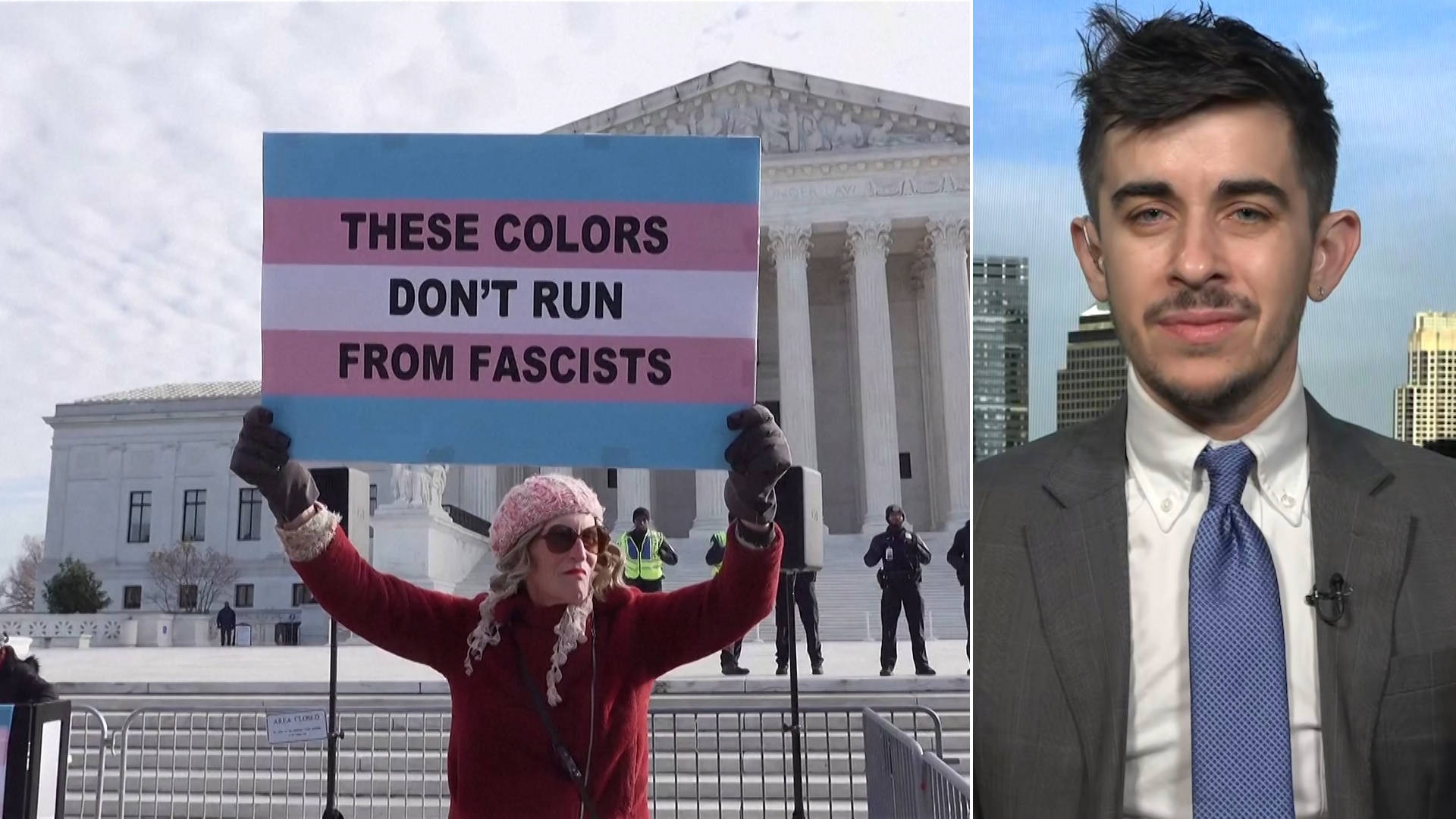This is a rush transcript. Copy may not be in its final form.
AMY GOODMAN: This is Democracy Now!, democracynow.org. I’m Amy Goodman.
The U.S. Supreme Court appears poised to uphold Tennessee’s ban on gender-affirming care for transgender youth after hearing arguments in a case that could have major repercussions for transgender people across the United States. The Biden administration and the American Civil Liberties Union argued against the ban, saying it’s a form of sex discrimination. But Chief Justice John Roberts and other right-wing justices appeared to reject that argument.
After the oral arguments, Tennessee Attorney General Jonathan Skrmetti spoke outside the Supreme Court.
ATTORNEY GENERAL JONATHAN SKRMETTI: The people of Tennessee, acting through a bipartisan supermajority of their elected officials, made a similar choice: They passed S.B. 1 to protect kids. Half the states in the United States have done the same. The Constitution allows the states to protect kids from unproven, life-altering procedures based on uncertain science. The states have exercised the power to regulate the practice of medicine for hundreds of years. …
The dramatic and unexplained increase in the use of these life-altering procedures on kids is exactly the sort of situation where the states should take notice and regulate. Adolescence is hard, and gender dysphoria is a heavy burden, and we need to remember that. But the evidence shows that the large majority of kids dealing with gender dysphoria will grow out of it, unless they’re put on these medications.
AMY GOODMAN: ACLU attorney Chase Strangio also spoke outside the Supreme Court, shortly after making history as the first openly trans lawyer to argue before the Supreme Court.
CHASE STRANGIO: Today, we were able to stand before this court and say the Constitution protects trans people just like it protects everyone else. It is breaking no new ground to recognize that when you are prohibited from receiving something because of your sex, that it is the role of the courts to ensure that the government can satisfy a burden of showing that it has a good reason for doing so. Tennessee did not meet their burden.
This law, we believe, is unconstitutional. And perhaps the scariest thing for all of us is that Tennessee’s arguments would apply if Congress tomorrow banned this care nationally for adolescents, for adults. They claim that there are no protections based on sex for the transgender people, like myself, who rely on this medical care.
AMY GOODMAN: That was ACLU attorney Chase Strangio, who argued before the Supreme Court. He’ll join us live in a moment. But first I want to turn to excerpts of Wednesday’s oral arguments. This is Tennessee Solicitor General Matthew Rice, followed by liberal Justice Sonia Sotomayor.
MATTHEW RICE: Our position is there is no sex-based classification. But to finish the answer, that to the extent that — that there — a law dealing with adults would pass rational basis review, that just means it’s left to the democratic process and that democracy is the best check on potentially misguided laws.
JUSTICE KETANJI BROWN JACKSON: So, in —
JUSTICE SONIA SOTOMAYOR: When you’re 1% of the population.
JUSTICE KETANJI BROWN JACKSON: Sorry. Mr. —
JUSTICE SONIA SOTOMAYOR: When you’re 1% of the population or less, very hard to see how the democratic process is going to protect you.
MATTHEW RICE: Well, Your Honor —
JUSTICE SONIA SOTOMAYOR: Blacks were a much larger part of the population, and it didn’t protect them. It didn’t protect women for whole centuries.
AMY GOODMAN: During the oral arguments, Justice Amy Coney Barrett, who was appointed to the Supreme Court by Donald Trump, asked if trans people have ever been discriminated against.
JUSTICE AMY CONEY BARRETT: We just head-on confront the question which you raise in the second part of your brief about whether transgender status should be a suspect class. One question I have is, at least as far as I can think of, we don’t have a history of de jure — that I know of, we don’t have a history of de jure discrimination against transgender people, right?
ELIZABETH PRELOGAR: So, I think you may be right that the discrimination, historical discrimination, against transgender people may not have been reflected in the laws, but I think there’s no dispute that there is a broad history here, and it hasn’t just been confined to private actors. I think that if you actually looked at the facts, there’s a wealth of evidence to suggest that transgender people throughout history have been subjected to violence and discrimination and maybe lost employment opportunities or housing opportunities, even in contexts where there might be state public employment at play.
AMY GOODMAN: That was U.S. Solicitor General Elizabeth Prelogar responding to a question from Justice Amy Coney Barrett. Justice Ketanji Brown Jackson, who was appointed by Joe Biden, expressed concern that the court was moving to undermine the foundations of what she called “bedrock equal protection cases.” She cited the 1967 decision in Loving v. Virginia that struck down a state ban on interracial marriage.
JUSTICE KETANJI BROWN JACKSON: And I guess my real concern — and maybe I’ll just ask you to react to my Loving parallel, because I’m getting kind of nervous — is that in Loving, those same kinds of scientific arguments were made. So, I’m reading here where the court says — the argument is that if the Equal Protection Clause does not outlaw miscegenation statutes because of their reliance on racial classifications, the question of constitutionality would thus become whether there was any rational basis for a state to treat interracial marriages differently from other marriages. On this question, the state argues the scientific evidence is substantially in doubt, and consequently, the court should defer to the wisdom of the state Legislature in adopting its policy of discouraging interracial marriages.
And so, for me, this kind of idea that the way we look at it is not, first, are you drawing these classifications, and then, state, give us your evidence so we can make sure that there’s a proper fit — if instead we’re just sort of doing what the state is encouraging here in Loving, where you just sort of say, “Well, there are lots of good reasons for this policy, and who are we, as the court, to say otherwise?” I’m worried that we are undermining the foundations of some of our bedrock equal protection cases.
CHASE STRANGIO: I share your concerns, Justice Jackson. I think one of the things that’s happening in this case is we’re seeing a lot of concerns that come in at step two of the analysis being imported into that threshold question of whether a classification has been drawn in the first instance, concerns about real differences between males and females. That is exactly what heightened scrutiny is intended to test in the application of heightened scrutiny. If Tennessee can have an end run around heightened scrutiny by asserting at the outset that biology justifies the sex-based differential in the law, that would undermine decades of this court’s precedent.
AMY GOODMAN: That was ACLU attorney Chase Strangio responding to Justice Ketanji Brown Jackson. Chase is co-director of the American Civil Liberties Union’s LGBTQ & HIV Project. On Wednesday, he became the first openly transgender lawyer to argue a case before the Supreme Court.
Chase, however this turns out, you have made history. Can you talk first about just the experience of being in the Supreme Court? Describe the nut of this case and how you think it went. What were you most surprised by?
CHASE STRANGIO: Well, thank you, Amy. It’s good to be with you and to relive some of those moments, which, when you’re in it, you don’t necessarily really internalize it as it’s happening. And so, I’m still replaying everything in my mind.
I’ll sort of speak first to what it felt like in the courtroom yesterday. And the first thing I’ll say is that it was incredible to have so many advocates who have worked to defend trans people for so long. And, of course, notably, yesterday, we were defended by the United States through the solicitor general, who was up at the lectern for over an hour answering questions about the straightforward claims that both the United States and the private plaintiffs represented by ACLU and Lambda Legal and Akin Gump were making, which is that there is a sex-based classification in this law.
It is very difficult to try to explain that away, because on the face of the statute that Tennessee passed, they say you cannot have treatment when it’s inconsistent with your sex. And I think one of the striking things about yesterday’s argument is that the solicitor general of Tennessee could not find his way out of that straightforward reality of the law that the Tennessee Legislature passed, that he was trying to defend on the ground that it was sex-neutral. Now, all of the conversations in the argument about the alleged risks of the treatment and what’s happening in Europe, none of that changes — first of all, it’s completely distorted. But, of course, none of that changes that Tennessee’s law draws this sex-based classification. And that is what Justice Jackson was really trying to get at at the end, is that we are not doing this analysis correctly. And she really refocused us on that point.
AMY GOODMAN: This is Tennessee Solicitor General Matthew Rice speaking during Wednesday’s Supreme Court oral arguments, interrupted by Justice Sonia Sotomayor.
MATTHEW RICE: As Justice Kavanaugh recognized throughout his questioning, they cannot stand up here and say that if these alternatives were imposed, that there would be no detransistioners. So, there is — they cannot eliminate the risk of detransistioners, so it becomes a pure exercise of weighing benefits versus risk. And the question of how many minors have to have their bodies irreparably harmed for unproven benefits is one that is best left to legislatures —
JUSTICE SONIA SOTOMAYOR: I’m sorry, Counselor. Every medical treatment has a risk, even taking aspirin. There’s always going to be a percentage of the population under any medical treatment that’s going to suffer a harm.
AMY GOODMAN: That’s Justice Sotomayor interrupting Tennessee Solicitor General Matthew Rice. Talk about the significance of this moment, Chase.
CHASE STRANGIO: One thing I’ll say that was really powerful was just how passionate particularly Justices Sotomayor and Jackson were yesterday. Sotomayor focused extensively on the harms to the adolescents at the center of this case and who are having their healthcare stripped away. And the point, I think, that she is making, that is so important, in that exchange with the solicitor general of Tennessee is that Tennessee is getting up there and saying, “We can do this because this medication carries risk.” Now, the district court in this case found that Tennessee’s allegations of harm in their prevalence were simply not supported by the record. But then, importantly, there is no medical intervention that does not carry risk. That is part of medicine, balancing the risks and benefits. And in all other circumstances, what Tennessee does is allow doctors and parents and then adolescent patients to weigh those risks and benefits and make a decision about what is best for the individual patient. What Tennessee has done here is displaced that thoughtful, often painstaking process that parents and their children have gone through with their doctors, and imposed this one-size-fits-all prohibition. And Tennessee really did struggle to justify that sweeping ban that they passed.
AMY GOODMAN: Chase, talk about the origins of this Tennessee case. Talk about who Skrmetti is and who the people are you’re representing.
CHASE STRANGIO: Yeah, absolutely. And I think the origins have to be placed in the context of this was a law that — of what was going on nationally. This was a law that was passed in 2023 at a time when almost half the country passed laws just like it. These are not homegrown, constituent-driven pieces of legislation. These are model bills that are shipped out to legislatures across the country and then rushed through supermajority legislatures that have an anti-trans objective and orientation. So, that’s the context.
They passed the law in March of 2023, and we, shortly after, filed a lawsuit to seek to have that law enjoined, because we knew that hundreds of adolescents in Tennessee would lose their healthcare, and future individuals who needed the healthcare would not be able to access it. We represent three adolescents and their parents who had been receiving this medical care in Tennessee, had that medical care cut off by operation of the law that was passed in March of that year, and then also represent a doctor, Dr. Susan Lacy, who provides this medical treatment both to cisgender and transgender individuals and was barred from providing the medication to her transgender patients. And so we represented her, as well. And we filed the lawsuit shortly after the law was passed by the Legislature, and then have been litigating this case over the past two years. And when we lost at the federal appeals court, overturning the lower court’s injunction of the law — in essence, allowing the law to go into effect — we took it to the Supreme Court.
AMY GOODMAN: Were you surprised by the fact that the Trump appointee Neil Gorsuch did not speak? Particularly interesting because he authored a 2020 ruling protecting transgender rights in the workplace. The case, of course, isn’t the same, but the significance of this?
CHASE STRANGIO: So, you know, you come out of these arguments, and obviously you can’t predict what the justices are thinking, even based on their questions. And it was striking, as everyone has noted, that Justice Gorsuch did not say anything during the argument. I don’t know what that means.
Obviously, we think that Justice Gorsuch’s opinion, majority opinion, in Bostock, the logic of that opinion clearly applies here. In Bostock, the court held that if an employer fires someone for being transgender, they are intentionally discriminating against them in part based on their sex. And that is because to discriminate against someone for being transgender is to discriminate against them because they have a gender identity different from their birth sex. That is exactly what this law does. It draws a line based on the fact that someone has a gender identity that differs from their birth sex. So there is a clear, logical parallel between Bostock and the Tennessee law and our claims in this case.
The fact that Justice Gorsuch did not engage in the argument doesn’t necessarily tell us anything. Sometimes justices don’t ask questions because they feel that the answers to the questions they had were presented in the legal briefs, in the written briefs. So, we’ll wait to see how he is thinking about this case in relation to Bostock, in relation to the constitutional jurisprudence that we relied on. And that’s all we can really do, is wait and see until they decide this case in June.
AMY GOODMAN: I want to turn to Supreme Court Justice Elena Kagan, who questioned the Tennessee Solicitor General Matthew Rice about the purpose of the Tennessee law.
JUSTICE ELENA KAGAN: Can I ask you about one of the purposes of this law? And I note that your brief does not talk a lot about this. But one of the articulated purposes of this law is essentially to encourage gender conformity and to discourage anything other than gender conformity. And I’m wondering how you think that plays into the analysis?
MATTHEW RICE: I disagree with that characterization of our law.
JUSTICE ELENA KAGAN: Well, encourage minors to appreciate their sex, and ban treatments that might encourage minors to become disdainful of their sex, sounds to me like we want boys to be boys and we want girls to be girls.
MATTHEW RICE: If I could —
JUSTICE ELENA KAGAN: And that’s an important purpose behind the law.
AMY GOODMAN: So, if you can translate this, Chase Strangio?
CHASE STRANGIO: Yeah, so, one of the features of Tennessee’s statute S.B. 1 is that it has a declared purpose, that the Legislature spelled out in no uncertain terms, of saying that in Tennessee it is important to the government that adolescents appreciate their sex assigned at birth and that the state has an interest in banning medical treatment that could cause adolescents to be disdainful of their sex assigned at birth. And what Justice Kagan is zeroing in on here is that it is very difficult, given that, to say that sex did not play a role in this statute that the Legislature passed. They are contorting words beyond recognition to try to argue that this is just a simple medical regulation. But the Legislature told us clearly that it is not. It is not just about regulating medical care. It is ensuring that individuals live and look like boys and girls in the way that that — what that means for Tennessee.
And so, I think what’s critical about that exchange and this feature of the law is it absolutely undermines Tennessee’s claim that this is just some straightforward medical regulation. This is not a straightforward medical regulation. In fact, it has no features of a straightforward medical regulation. It categorically bans treatments only when it is inconsistent with sex, and does so for the declared purpose of encouraging adolescents to appreciate their sex and preventing them from being disdainful of their sex. Whatever Tennessee may try to do to paint that as a benign purpose, it is certainly a sex-based purpose.
AMY GOODMAN: I want to go to Supreme Court Justice Samuel Alito questioning, well, our guest, Chase Strangio, a lawyer with the American Civil Liberties Union, representing the families challenging the Tennessee law.
JUSTICE SAMUEL ALITO: Could we explore what intermediate scrutiny might look like in operation in assessing laws like Tennessee’s? So, the solicitor general, on pages — on page 48 of her brief, lists a lot of things that she says, “Well, if Tennessee were really concerned about the health and welfare of these minors, it would have taken into account a variety of things.” So, one is waiting periods. Another is whether puberty blockers should be exempted. Another concerns things to make sure that the future of these minors is properly respected, even though they personally cannot make mature judgments about potentially irreversible procedures, so she mentions things like two-parent — two-parent consent or counseling, readiness criteria, age recommendations, licensing certification or reporting requirements for physicians, and other guardrails which are not specified.
Would it not be the case that individual — that judges would have to decide which, whether a particular package containing this much of that and that much of the other thing, is sufficient? Wouldn’t this be endless litigation based on — with the decision based on determinations by lay judges regarding complicated medical issues?
CHASE STRANGIO: So, if I could make two points in response, Justice Alito? And the first is going back to the solicitor general’s example of West Virginia, where West Virginia looked at the underlying science and, instead of categorically banning this medical treatment, created pathways with guardrails for individuals to access medical care. There have been no litigation over West Virginia’s law. And if there were, as if there were in other contexts, the question would remain whether or not the state could make out the showing that this is being treated in such a substantially different way than other forms of medical care. I do think that judges are equipped to make those determinations, as they do in many other contexts.
AMY GOODMAN: So, that’s Chase Strangio being questioned by Supreme Court Justice Samuel Alito. Was there any other point that you wanted to make on that issue, Chase?
CHASE STRANGIO: Yeah, I mean, I think that one of the themes of the argument yesterday was this is simply not the role of the courts, that the courts don’t step in in areas of scientific and medical uncertainty, that this is just within the police power of the state to regulate. And you heard similar remarks from the Attorney General Skrmetti in his post-argument press conference.
And, of course, it is precisely the role of the courts to step in when the government infringes on the individual constitutional rights of minority groups. That is why we have a judicial check on the legislative branch, to ensure that those individuals who are routinely targeted for discrimination are not being subject to that discrimination without a check from another branch of the government.
So, it is such a distortion to — and I think this is really what Justice Jackson was alluding to — to sort of have justices throw up their hands and say, “This is just part of the democratic process.” That’s absolutely not true. When the government makes distinctions in law based on race and based on sex, it is precisely the role of the court to step in and say, “When you do this, we have to make sure that you can show your work, that you are in fact drawing those distinctions for reasons that are legitimate.” And so many times they are not. And that is why we have these suspect classifications like race and sex, because we have a long history in which the government has acted in ways that has harmed individuals, and the courts step in to ensure that there is a check on that majoritarian overreach into the equality and liberty protections of individuals.
AMY GOODMAN: I want to go back to more of Supreme Court Justice Samuel Alito questioning you, Chase.
JUSTICE SAMUEL ALITO: A lot of categorical statements have been made this morning, in argument and in the briefs, about medical questions that seem to me to be hotly disputed. And now, that’s a bit distressing. One of them has to do with the risk of suicide. Do you maintain that the procedures and medications in question reduce the risk of suicide?
CHASE STRANGIO: I do, Justice Alito, maintain that the medications in question reduce the risk of depression, anxiety and suicidality, which are all indicators of potential suicide.
JUSTICE SAMUEL ALITO: Do you think that is clearly established? Do you think there’s reason for disagreement about that?
CHASE STRANGIO: I do. I do think it is clearly established in the science and in the record.
AMY GOODMAN: This is the last argument we’re going to take on, Chase Strangio, and that is this issue of — first, make the distinction between suicide and suicidality. And when you watch the arguments being presented by people on television networks leading up to this, this was the main issue, as those that supported the Tennessee ban said, in fact, the real issue is people who want to take their own lives after they’ve gone through the transition. If you can address this whole issue? And what are the studies that you’re basing this on, Chase?
CHASE STRANGIO: Yeah, so, this is just such an unbelievable, disturbing distortion. First of all, there is absolutely no evidence that there is an increased risk of suicide from the gender-affirming medical care that Tennessee bans. The record shows, the evidence overwhelmingly shows that this is medical treatment that reduces depression, anxiety and suicidality, all indicators of ultimate suicide attempts. So, that is very clearly established in the science. What the other side is trying to do is say there’s no proof that — in studies, that there is a reduction in completed suicides. And the only reason for that is because completed suicides, thankfully, are very rare, and so you can’t make a statistical analysis when you have something like one completed suicide versus zero completed suicides. And so, that is just a complete distortion of what we know to be true about indicators of ultimate suicide.
And taking a step back, I think we all would want to reduce distress, depression, anxiety and suicidality, which is precisely what these medications do. And so, there are studies. There’s, you know, this Green et al. study. There’s the Tordoff et al. study. These are recent studies from 2022 and 2023 that show substantial reductions in suicidality among adolescents who have had access to this medical care, reductions close to 40%. So, this is significant for a population of young people who have extraordinarily high rates of experiencing suicidal ideation.
And what Tennessee has done is taken away the only evidence-based medical care to relieve the suffering of the adolescents who are seeking to just live their lives, whose parents are trying to support their children, whose doctors are recommending this treatment. And so, all of the questioning sort of trying to nitpick at the individual studies, when what Tennessee offers is no alternative at all, no evidence in support of forcing people to wait until they’re 18, only to be potentially subject to a ban on adults in the coming months or years. And so, this, I think, is just incredibly disturbing. People are suffering. They just want to be able to live their lives, and this law takes those opportunities away from them.
AMY GOODMAN: Chase, my last question — and we just have a minute — goes back to the first, which is you have just made history, no matter the outcome of this case, as the first openly trans lawyer to argue before the Supreme Court. You wrote a guest essay in The New York Times, “May It Please the Court: Trans Health Saved My Life.” If you can address this as we wrap up?
CHASE STRANGIO: What I’ll say is, I was able to stand before the lectern at the Supreme Court yesterday because I have had access to the medical care that the state of Tennessee now bans. And they are making it less likely that there will be future people who will be able to step before the court, because they are taking away the healthcare that we need. So we will keep fighting. It is an honor to be trans. It is an honor to do this work. No matter what happens, we will take care of each other, and we will keep fighting.
AMY GOODMAN: Chase Strangio, co-director of the American Civil Liberties Union’s LGBTQ & HIV Project. On Wednesday, once again, he became the first openly trans lawyer to argue before the U.S. Supreme Court, as the court takes on Tennessee’s ban on gender-affirming care for minors. We’ll link to your New York Times piece, “May It Please the Court: Trans Health Saved My Life.” And congratulations, Chase.
CHASE STRANGIO: Thanks, Amy.
AMY GOODMAN: Coming up, we continue our conversation with Pulitzer Prize-winning journalist Ronan Farrow on his new film, Surveilled, looking at the dangers of surveillance spyware. Stay with us.











Post comments (0)